- Home
- Neal Asher
The Line of Polity ac-2 Page 5
The Line of Polity ac-2 Read online
Page 5
"You're very fast," someone said.
Oh shit.
The gym was supposedly closed to everyone but Scar and himself, so somehow this man must have got past the dracoman. He appeared young and very fit, which did not mean he was necessarily either, and he wore a gi, so it was clearly not his intention to spectate. Cormac watched him approach, noticing a strong hint of Japanese about him, and something familiar. Five paces away from Cormac, the Japanese bowed in a fighter's fashion — that is, he did not once take his eyes from Cormac, who returned the courtesy.
"Who are you?" Cormac asked.
The man grinned and slid into a fighting stance. Cormac did the same. He felt easy about this: he knew he was good and he was already warmed up, whereas his adversary might only have the benefit of the former. They closed, exchanged a few testing punches, all easily blocked. Out of the corner of his eye Cormac saw Scar step into the gym to stand watching with his arms folded like some paternal sensei. Curiouser and curiouser.
"Scar let you in here?" said Cormac, flicking his foot up at the side of his opponent's head as if to emphasize the point.
"He knows I have nothing but the best intentions," said the man, after successfully ducking the attack. He then countered with three kicks in quick succession, the last of which — a thrust kick turned into a reverse roundhouse at the last moment — nearly taking Cormac's head off. Cormac leapt back, countering the rapidly following punch with a crescent kick. He then himself went into the attack — and meant it. That last kick could have caused him some real damage. This was to be no game. They proceeded to exchange blows too fast for the casual observer to follow. Cormac felt his opponent's rib give under one of his strikes, then felt one of his own go immediately after. The next thing he knew, a foot cracked against his temple, then swept his feet away. He was now on his back, a straight-fingered strike poised, withheld, but ready, over his throat.
"You are fast," he admitted, panting.
The 'Japanese' stepped back, shrugged, and suddenly appeared a lot older. Cormac immediately recognized him.
"You're not so slow yourself, Ian Cormac. You're the first to manage that in a long time." He pushed his hand against his ribcage and there was a click. He shrugged again and stood upright. That he had a cracked rib showed not at all. Cormac pushed himself laboriously to his feet. His own busted rib was just beginning to hurt.
"Here, let me," said Blegg, and reached out to press his palm against Cormac's chest. A flush of warmth, the pain went away.
"How the hell did you do that?" he asked.
Blegg smiled and waved a hand at their surroundings. "I can do anything here — as can you, should you will it," he said.
Cormac walked to the side of the room and picked up a towel to wipe his face.
He gave the dracoman a calculating look. "Learnt anything interesting?"
Scar showed his teeth.
Cormac turned back to Blegg, who had followed him, and seemed to be sweating not at all. What did he mean, 'I can do anything'? Then Cormac suddenly realized what the comment might indicate. He held out the towel and let it drop, then, with a small exertion of will, stopped the fabric in midair.
He glanced at Blegg. "Total immersion?"
Blegg nodded once.
"How much of my memory is repressed?" Cormac asked.
"Enough for the civilities, but now you will remember where and when you are."
And Cormac did. He remembered his mission on Samarkand — that world devastated by the alien entity calling itself 'Dragon' — then his long sojourn on Earth after having spent far too much time trying to find the source of a contract that had been put out on his life — only to discover it was Dragon who wanted him dead. But whether that contract had been put out by the sphere he had killed or another, he did not know — for Dragon was now essentially four entities, each a living sphere a kilometre across. During that sojourn he had, not for the first time, considered retirement, then quickly rejected the idea. Thereafter had come the quick resolution of a problem involving a small group of amphidapt Separatists on Europa, which had then resulted in his pursuit of a biophysicist called Skellor, whom Earth Central Security had been watching for some time. This pursuit had been long but not particularly troublesome — Skellor having a tracer layered in a memplant he had purchased while watched by ECS. Then on to the Line-patrolling dreadnought the Occam Razor — and now here…
"Get to the point," said Cormac, regaining his impatience.
"As you will," said Blegg, waving a hand.
Instantly a black line split this reality, opened and swept away the entire dojo, and the dracoman along with it. Now Cormac found himself standing on a floor of glass in open space. He gazed down to where Blegg pointed and saw the huge Outlink station Miranda, suspended there. Around it, in speeded time, gathered a fleet of ships, and before his eyes the station began to come apart.
"This was Outlink station Miranda five solstan days ago. It was destroyed by a mycelium similar to the one used to destroy the Samarkand runcible," said Blegg.
"Deaths?" inquired Cormac, his urgency to find Skellor now seeming childish to him.
"Twenty-three of the Outlinkers refused to leave, but there was time enough to evacuate the rest."
"Did Dragon plant the mycelium? Are we talking outright hostilities with it now?"
"One of the spheres — it is well to remember that they are separate entities now — may have been involved. You will travel to this place in the Occam Razor, and you will find out what is happening, then take whatever action you deem necessary."
Cormac stared thoughtfully at the Outlink station as great swathes of its hull unpeeled and explosions sparkled its surface. "If Dragon really is involved, I could do with some assistance out there."
"You are thinking of Mika, the life-Coven woman from Circe."
"I am," said Cormac.
"You are also thinking of what she might learn from the materials gathered from that base on Callorum," said Blegg. Cormac shrugged, and Blegg went on, "The nearest Polity outpost on your direct route to Miranda's last position is the asteroid smelting station, Elysium. Mika will be there when you arrive."
"What about the rest of the Sparkind?"
"Once you are at Elysium, copies of Aiden and Cento, having been transmitted through the runcible there, will upload to memory space in the Occam's AI and, should you require them, they can be downloaded into spare Golem bodies that the ship carries. You already have Gant and Scar with you. Thorn, unfortunately, is otherwise engaged."
Cormac nodded, good enough — though working with Golem copies always made him edgy. The minds of Aiden and Cento would be no different from those of their originals, only the bodies would be different, though not visibly, so there was no logical reason for his edginess — just a personal quirk he supposed.
"Anything else I should know?" he asked.
"The nearest inhabited world outside the Line to where Miranda was destroyed is one aptly named Masada. It is interesting to note that the theocracy ruling that world ordered, some time ago, the construction of a kinetic missile-launcher, ostensibly to defend Masada against Dragon."
"What might they hope to achieve with it otherwise?" asked Cormac.
"The utter suppression of a rebellion that is, literally, underground."
"Explain."
"The rebels live in caves. And a kinetic missile-launcher of sufficient power can penetrate deep into the ground."
"I see."
Cormac stared at Blegg, trying to see the wheels within. The ancient Japanese was unreadable but then, in Cormac's experience, Blegg was only as readable as he wanted to be. He was named agent Prime Cause. He would perhaps better have been named Prime Manipulator.
"Is this another of your games?" he asked.
Blegg gazed at him with eyes like enamel buttons.
"The Occam Razor is not actually the nearest Line patrol dreadnought but, considering the possible involvement of Dragon, you are the most suitable choice of
investigator and… facilitator." As Blegg spoke, the dojo once again folded in around the two of them, only this time minus the dracoman. "No games, agent Cormac. We have no time for them now." And, with that, Blegg walked to the door of the dojo. Cormac paused for a moment before following him. There were other questions; there always were. When he stepped into the corridor beyond, Blegg was gone: the Cheshire Cat and the Mad Hatter rolled into one. Cormac returned to the dojo, and closed his eyes.
"End program," he said succinctly.
Now he felt his body assume its original pose: the Pharaoh position, as in the kata. The temperature changed abruptly and he felt a tingling stinging at the sides of his head. When that sensation ceased — signifying that the nanofibres had been withdrawn from his cortex — he reached up and pulled aside the auging clamp. Opening his eyes, he saw the ship's drone hovering before him and, glancing around, he once again located himself in the Occam Razor's VR suite.
"We go to Elysium, and from what I know of the place, that is certainly the most inapt description," he said, stepping from the support frame.
The drone dipped in midair as it, no doubt, relayed this information to Tomalon.
The entire Separatist base lay packaged and strapped down in one small section of one of the huge holds. A shimmer-shield, from ceiling to floor, divided off this section from the rest of the hold, no doubt to prevent wastage of the inert gas that was now being pumped in. Skellor observed the security drone suspended from the ceiling like some art deco light fitting and, whilst sweating in his environment suit and watching in panic the count trickling away on the air-supply indicator displayed in the bottom corner of his visor, called up a specific viral subprogram in his aug. It was getting easier to do this now. No longer did he feel the crystal matrix AI as something separate from himself — it was he who was remembering the program, and he who was opening the soft link to the security drone.
The link established itself with a click that was almost audible to him. He felt the subprogram uploading through it, and he observed that program draining from the temporary memory spaces in his crystal matrix aug like acid from uncorked carboys. Letting his attention follow it through, he observed the drone's internal defences spiralling out like informational smoke, and in virtual space he erased them. Then he killed the drone and withdrew, subverting its uplink to Occam, to leave only a program to respond to the constant query signal from the ship's AI that the drone was still functional.
Skellor let out a gasp and reached down to fumble for the shut-off button. Around him, the air flickered and he was revealed standing by a stack of crates below the drone. Looking down at the chameleonware generator on his belt — an object like a large white snail shell with a touch-console mounted in its mouth — he noted that he had shut it off just minutes before it would have done so itself. He rested his hand against its glossy surface and felt the heat of it — he had not yet found a way of running a personal generator for longer than a few hours without overloading it, as the power required to run such a device was huge.
He moved away from the crates to stand before the shimmer-shield, still keeping an eye on his air supply. Probing into the walls of the hold, he soft-linked, but was gratified to discover that the shield only linked back to Occam to inform the ship AI that it was functioning, not whether someone had stepped through it. Skellor then stepped through, the shield tugging and pressing against him so that it felt as if he were pushing through thick jelly. Once he was through, another display in the corner of his visor, which heretofore had only read 'Argon', now showed that the usual mix of breathable gases surrounded him. He removed his mask and took a deep breath of air redolent of metals and warm electronics, which was always the recognizable taint of ship air. Moving to the wall of the hold, he sat and closed his eyes to more closely explore his relationship with his crystal matrix AI, and found that, of course, it was killing him.
It was a given that direct interfacing with an AI would kill the human participant by blowing each synapse like a fuse in an increasing cascade, and would also drive the AI into its own particular version of insanity. For centuries, researchers had tried to construct AIs more amenable to the joining, but had always failed. This was unsurprising as such a joining was comparable with attempting to weld a lump of steel to a candle — it didn't matter what you did with the steel: the welding process would always be too hot for the candle wax. Skellor's answer to this conundrum was that you didn't weld, you used glue instead. Presently he had yet to use the glue — and the AI had yet to completely burn him out, because it was not fully online. He had also only been directly interfaced for an hour before that bastard Polity agent had turned up.
Now it was time for Skellor to use the glue.
The egg-shaped container he cupped in his hand was as much Jain technology as was its contents, for the contained nanotechnology would overrun even an inert material. Lining the inside were billions of nano-constructs whose sum purpose was to deliver the message 'not yet' to the living node they surrounded. Skellor turned the egg so it stood on its end, and linked through to it. Immediately he felt poised at a portal into a vast space crammed with a tangle of glittering and vastly complex shapes. Pulling back, he paused for a moment and considered his options. If he remained linked to the AI, without using this Jain node, he would die within a few hours. If he disconnected from the crystal matrix AI aug, he would return to his previous state, and that was unacceptable. Even with the AI not fully online, he found himself easily capable of working through formulae he had been unable to even begin with before; his memory was now eidetic, and his grasp of his own work huge. Disconnection would also lead to his capture, and for some of the things he had done he would most certainly end up being forcibly mind-wiped. His remaining choice rested in the palm of his hand.
Skellor sent the initiation code and watched as the egg opened like the petals of a flower, to expose the Jain node. It was another egg, a smaller version of its container — a metallic egg mottled with complex cubic patterns. It didn't look much, even in this age when a planetary governor could fit into an ashtray, and when a weapon of planetary obliteration was not necessarily much bigger than that. But, in its own way, it was immense. It was still a source of amazement to Skellor that he, of all people, had found this object, when people all across the Polity had been searching for such things for centuries. He knew that corporations spent billions on Jain research, that whole planets had been the subject of archaeological digs, that there were some truly titanic AIs whose only purpose was to find something like this. Yet where had he found it?
The world was wintry, but not killingly cold. Across its mainly oceanless surface grew forests of deciduous trees, none more than fifty years old, as it was only fifty years before that the orbital mirror had been moved into place and the planet heated enough to sustain Terran life-forms. Great canals directed water down from the slowly melting poles to fill up those cavities in the land earmarked as future oceans. It was beside one of these nascent oceans that a spaceport had been established, and where it was rumoured that a runcible facility would soon be installed. Skellor found the market on one of the huge jetties under construction on the yet-to-be-filled ocean's bed. The stall was one of the few not doing very much business, it being cluttered with items that most Polity citizens would discard without a second thought. He had been on the point of heading back to his hotel, for the day was cold and drizzly, and a storm was predicted to drift in from the northern outflow — but a grubby hand reached across and clasped his jacket.
"I got some good stuff that ain't on display, my friend," said the owner of the hand.
Skellor studied her: she looked of a type — those who bought passage to new worlds, then couldn't be bothered to work hard enough to make a decent life for themselves, or to raise enough money to move on. Her cosmetic work was out of date, her clothing shabby, and she had that look of perpetual anger at circumstances she did nothing to correct.
"Like what?" he asked.
; Quickly she pulled three plastic cartons from under the table and opened them on its surface. The first carton contained artificial gemstones suitably adulterated to make them look like the real thing, the second contained a selection of augs of the type that would scramble your brains within a week, and the third contained a grey egg and a bag of broken coral.
"See," she said, holding up a Sensic augmentation.
Skellor turned to go, but then allowed his attention to stray back to the third carton.
Where had he seen coral like that before?
"What's that?" he asked, pointing.
She picked up the bag and shook it. "This is real coral, from the Barrier Reef on Earth."
"How interesting," said Skellor, knowing that the chances of stealing coral from that place were equatable with the chances of beating the Earth Central AI at chess. Again about to turn and leave, he remembered where he had before seen coralline objects such as these. In the Tranquillity Museum on Earth's moon: in a chainglass case inside a security chamber everyone was aware could be ejected from the Museum at a moment's notice, to be obliterated in space by CTD — Contra Terrene Device — that euphemistic term for an antimatter weapon.
"All right, how much do you want for them?" he asked.
"You have to buy the whole carton," she replied. "Twenty shillings."
"I don't want that egg thing, so I'll give you ten."
Glancing at the purple swirl of cloud to the north, the woman agreed.
The node was changing colour and there seemed to be movement: interchange within the cubic patterns on its surface. A year of research had revealed to him that the coralline objects were certainly Jain, and certainly useless. Fifteen years of research had revealed perhaps one per cent of the secrets of the node, but enough to put him way ahead of any competitors in his field, and to give him an understanding of what he was dealing with. Tipping the object into the gloved palm of his hand, he raised it to his lips.

 The Bosch: A Novella (Polity Universe)
The Bosch: A Novella (Polity Universe)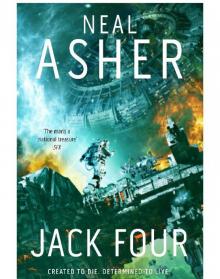 Jack Four
Jack Four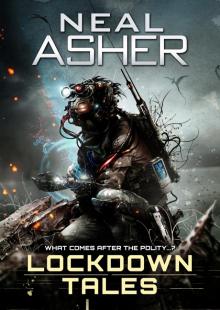 Lockdown Tales
Lockdown Tales The Warship
The Warship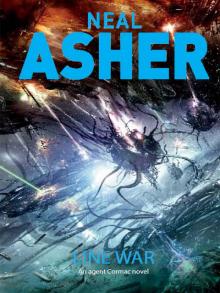 Line War
Line War Total Conflict
Total Conflict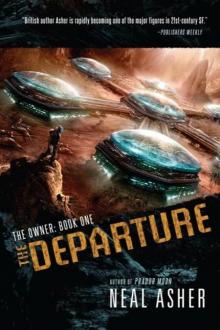 The Departure
The Departure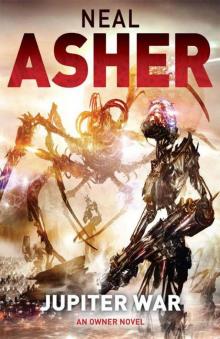 Owner 03 - Jupiter War
Owner 03 - Jupiter War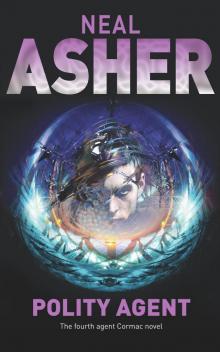 Polity Agent
Polity Agent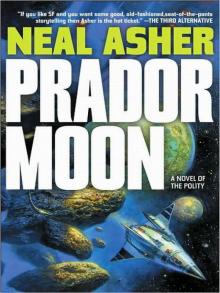 Prador Moon
Prador Moon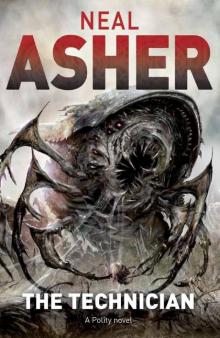 The Technician
The Technician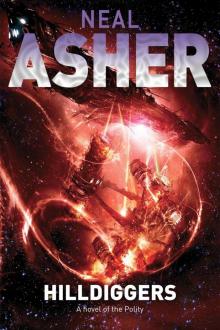 Hilldiggers
Hilldiggers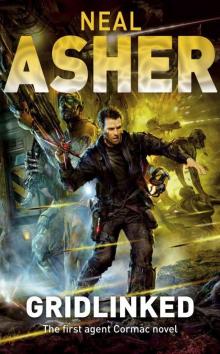 Gridlinked
Gridlinked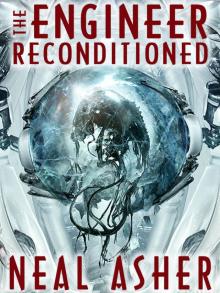 The Engineer ReConditioned
The Engineer ReConditioned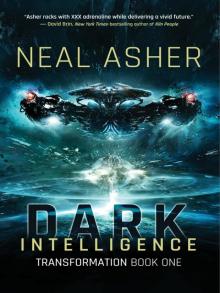 Dark Intelligence
Dark Intelligence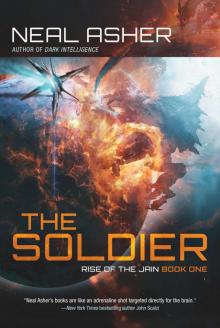 The Soldier: Rise of the Jain, Book One
The Soldier: Rise of the Jain, Book One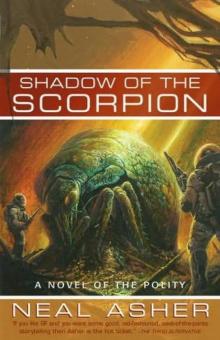 Shadow of the Scorpion p-2
Shadow of the Scorpion p-2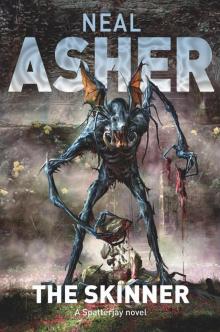 The Skinner
The Skinner The Soldier
The Soldier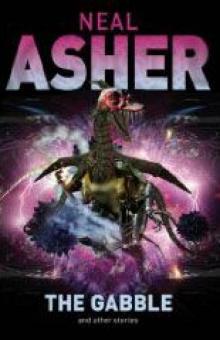 The Gabble p-13
The Gabble p-13 The Gabble and Other Stories
The Gabble and Other Stories The Parasite
The Parasite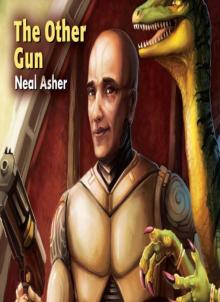 The Other Gun
The Other Gun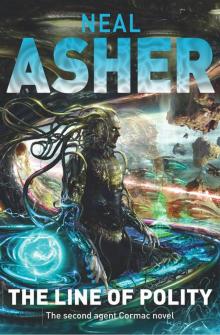 The Line of Polity
The Line of Polity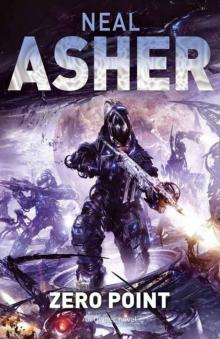 Zero Point (Owner Trilogy 2)
Zero Point (Owner Trilogy 2)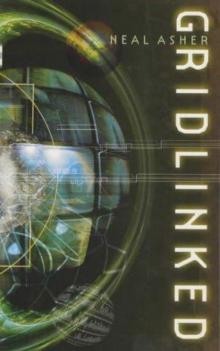 Gridlinked ac-1
Gridlinked ac-1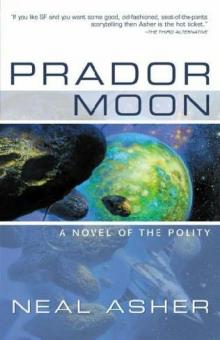 Prador Moon p-1
Prador Moon p-1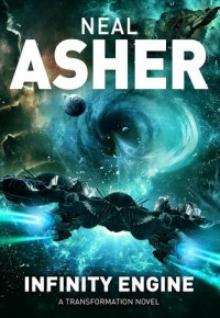 Infinity Engine
Infinity Engine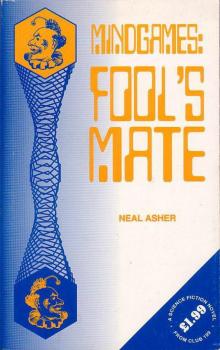 Mindgames: Fool's Mate
Mindgames: Fool's Mate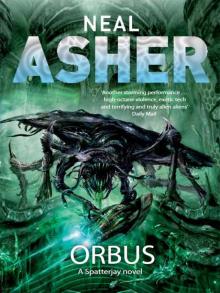 Orbus
Orbus Africa Zero
Africa Zero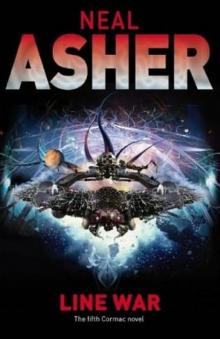 Line War ac-5
Line War ac-5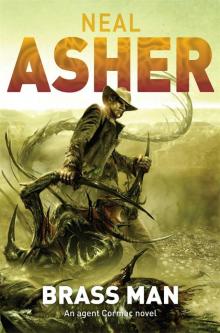 Brass Man
Brass Man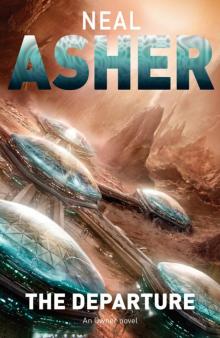 The Departure to-1
The Departure to-1 Cowl
Cowl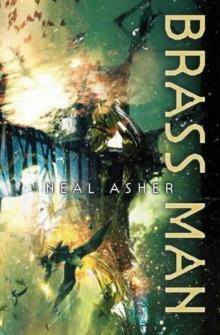 Brass Man ac-3
Brass Man ac-3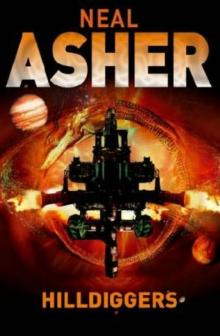 Hilldiggers (polity)
Hilldiggers (polity)![Greg Bear - [Eon Trilogy 1] - Eon (rescan) (v1.0) Read online](http://i1.bookreadfree.com/i2/04/08/greg_bear_-_eon_trilogy_1_-_eon_rescan_v1_0_preview.jpg) Greg Bear - [Eon Trilogy 1] - Eon (rescan) (v1.0)
Greg Bear - [Eon Trilogy 1] - Eon (rescan) (v1.0)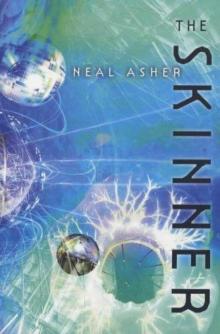 The Skinner s-1
The Skinner s-1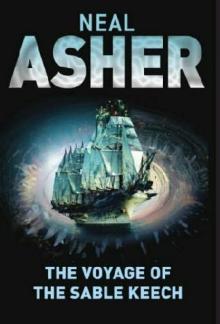 The Voyage of the Sable Keech s-2
The Voyage of the Sable Keech s-2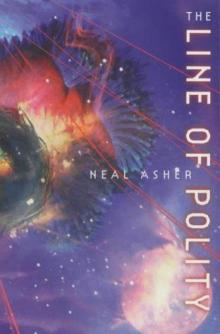 The Line of Polity ac-2
The Line of Polity ac-2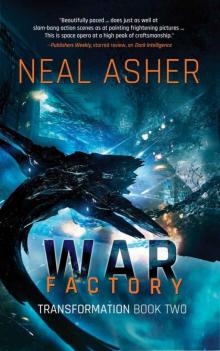 War Factory: Transformations Book Two
War Factory: Transformations Book Two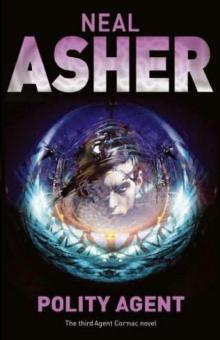 Polity Agent ac-4
Polity Agent ac-4